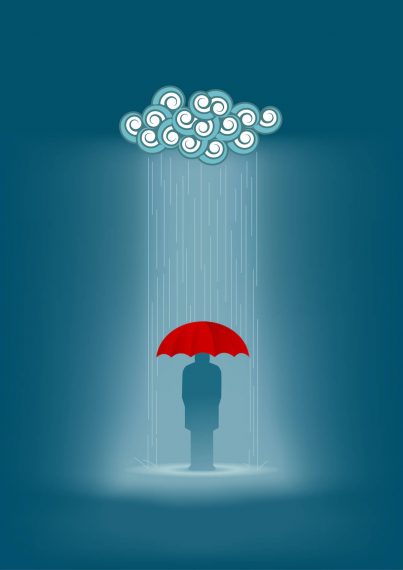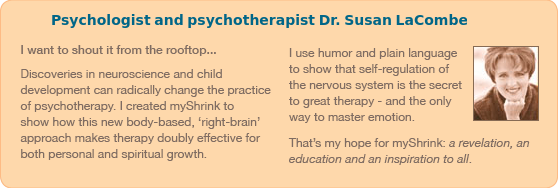Depression is not caused by a virus like a cold or the mumps. There is no blood test that declares the presence of depression.
There are many theories on the causation of depression but unfortunately none have been conclusively validated.
Here's part of the picture.
Depression is not a disease!
The pet theory of the pharmaceutical industry that depression is the result of a serotonin deficiency in the brain, has also not been confirmed.1 Dozens of studies have yielded no substantiation of this claim.
In the absence of a clear cut understanding of why some people suffer from depression and others do not, the air becomes filled with platitudes that suggest it's just a matter of "pulling yourself together".
Nothing could be farther from the truth.
A new way of looking at what causes depression
It's not likely that you'll get this perspective on depression from your traditional counselor or physician. However it is based on solid findings from neuroscience and it is shared by many practitioners who use a somatic or body-based approach in their clinical practice.
Although the following is to some extent speculative, it is based on our continually evolving understanding of the physiology and neurology of brain development and function.
My hope is that it will validate the emotional and physical experiences of those who suffer from depression, especially when their concerns have been dismissed by family, friends and physicians.
The basic premise
Our current understanding of the nervous system leads us to believe that structures in the right brain figure prominently in the development of depression. (This suggests that left brain scolding, such as "just think differently" or "just snap out of it" are not the way to relieve depression symptoms, not to mention insulting to the individual.)
This is also why right brain activities such as yoga, painting, crafts and being in nature are so healing.
It also explains the success of body-based (right brain) approaches in psychotherapy and why the relationship with your therapist is so important (See Why Holistic Therapy Matters for a more detailed explanation.)
Two things about depression pose a conundrum for most people.
- First, you don't have to feel sad to be depressed. Understanding what's going on in the autonomic nervous system explains this.
- Secondly, you have no control over your thoughts, so memories from the past keep resurfacing.
Why One Doesn't Have to Feel Sad to be Depressed
Technically stated, it's the nervous system that's de-pressed.
In depression, the nervous system operates in "conservation" mode, which is why fatigue is a defining feature, not sadness.
Oh for sure you may feel "sad" that you don't seem to have energy for anything anymore. And you may have also noticed that you can't seem to sustain "happy moments".
However, if your childhood has not been marred by neglect, abuse or a lack of attuned care, you may not have "sad" memories dominating your thoughts.
Why is the autonomic nervous system in conservation mode?
In effect, depression is a sign of a nervous system in shut down mode. Over a period of time the nervous system has inadvertently been maxing-out in its capacity to handle stimulation/stress.
In many cases, this deterioration has been a slow process that's gone unnoticed by you.
You see, you can unknowingly adapt to this process by gradually decreasing the intensity or range of your regular activities. It's been happening in the background of your life, and you didn't notice because it's been so gradual!
You may even have thought "oh, I guess I'm getting older".
In the lingo of a body psychotherapist, you've "moved into the minimus".
If you think of the body as a container, then depression is a sign that there is no room left to take in more stimulation. The "cup is full" and so one avoids socializing with friends or getting involved in anything even moderately stimulating or stressful.
How did I get so "full"?
It's helpful to think of it this way. Every day your nervous system handles stimulation and stress, both of which increase our level of activation. A healthy autonomic nervous system manages this activation by discharging the energy.
But if your nervous system is dysregulated, the processing that stimulation/stress will not be efficient, and the energies that can't be discharged will begin to accumulate.
What do you mean by "dysregulated"?
If you are suffering from depression then your nervous system is "dysregulated" by definition. It doesn't manage energy (i.e. activation) well.
Dysregulation means your nervous system is not processing stimulation in the way that it is designed to do. So If we're exposed to X amount of stimulation while awake, then optimally, we should discharge that same amount, both during the day and after going to bed. Ideally we awake the next day feeling refreshed.
But if your nervous system is dysregulated then it holds on to some of that energy. Let's say you discharge 99.001% of that energy every day. So over the years you've been holding onto .009%, which isn't too much for any given day. But when you add that up over the years you'll feel the effects because eventually there's no more room!
The result of retaining this energy is revealed in the way the muscles and viscera become held. For instance, the muscle can be in a collapsed or in an extremely tight position. Bodyworkers are familiar with this tendency (which suggests in part, how specific kinds of bodywork might be helpful).
The end result is that dysregulation means you don't manage stress efficiently as you could when you were younger.
How did my nervous system get dysregulated?
Both trauma and early development (even the environment in the womb) play a role in creating how your nervous system works. Although the role of heredity is often overstated, it is a factor.
Ultimately, you alone are responsible for your health. Yet there is much that you can do to repair and optimize your nervous system. Our purpose on this site is to show you how, and to support you in your efforts.
Why is our thinking focused on the past when we're depressed?
It has to do with state-dependent memory. Memories are encoded together with the state of the mind-body at the time they're first laid down. When we feel depressed, this state is tapping into the memory of previous times we experienced this depressed state.
To fully appreciate this idea it's helpful to understand how the brain organizes itself.
The success of our species has depended on our ability to "put two and two together". In other words, we notice associations between ideas and we profit from it--we can connect the dots. The brain is designed and organized to make these associations, and the more connections there are between neuropathways, the more associations there will be for us to make.
A consequence of this interconnectivity within the brain is that specific memories get associated with the mind-body state at the time the memory was acquired. So if I feel angry right now, it will be easier to remember the last time I felt angry. If I feel agitated it's easier to recall the last time I felt that way.
Some of these depressive states might well be associated with memories formed during infancy. This might explain why there is no identified memory (Note that the hippocampal memory for facts, names etc. doesn't come online until ~age two).
We have only recently begun to appreciate how vulnerable we are during infancy. The human nervous system is still developing during this time. Even well-meaning and good-hearted parents can inadvertently provide care that overwhelms or underwhelms the baby nervous system.
Hormonal changes play a role
Hormonal changes during depression influence not only our behaviour but also our thoughts. During depressed states our left brain gets hijacked by the reptilian and limbic parts of our brain. Our thinking moves into problem-solving mode. The brain attempts to "solve" the problem (i.e. of the depressed state) by conjuring up plausible reasons.
This naturally leads us into the past where we last felt this depressed state.
How does this help me deal with depression?
Very briefly, it means body-based treatments can get to the physical (i.e. somatic) roots of depression because they have a direct impact on the nervous system. Somatic therapy, mindfulness meditation, yoga and other related forms of healing are predictably--based on the way the brain is organized--an efficient means for dealing and recovering from depression.
This doesn't mean talk therapies aren't healing. In fact we have every reason to believe that activities that integrate the right and left brain are beneficial.
What I'm suggesting is that you add these right-brain-based activities into your treatment plan.
My Personal Musings
I firmly believe that if you include a body-based approach in your therapy sessions, your progress will be significantly faster, and your overall time (and money!) spent in therapy will be much less.
Notes
1 In fact, there is evidence to suggest that most people who have a deficit of serotonin do not become depressed! As mentioned in: Sparks, Jacqueline A., Duncan, Barry L., and Miller, Scott D. (2006) PDF format Integrating Psychotherapy and Pharmacotherapy: Myths and the Missing Link.
References
Kendell, R., Jablensky, A. (2003) Distinguishing Between the Validity and Utility of Psychiatric Diagnoses. Am J Psychiatry 160:4-12 [Electronic Version]
"At present there is little evidence that most contemporary psychiatric diagnoses are valid, because they are still defined by syndromes that have not been demonstrated to have natural boundaries."
Porges, Stephen, (1995). Orienting in a defensive world: Mammalian modification of our eveolutionary heritage. A polyvagal theory. Psychophysiology, 32, 301-318.
Stephen Porges' identified two, not one, branch of the parasympathetic nervous system. His discovery of the dorsal vagal and ventral vagal has helped us to understand how the experience of depression develops. The polyvagal theory has also been useful in understanding the mind body connection. You can access his classic 1995 article here (you will be taken off site:
Orienting in a Defensive World...A Polyvagal Theory.
Rothschild, Babette, (2000) The Body Remembers: The Psychophysiology of Trauma and Trauma Treatment, London: W. W. Norto & Company.
Scaer, Robert, C. (2005). The Trauma Spectrum: Hidden Wounds and Human Resiliency. New York: W.W. Norton & Company.
A nervous system that has moved into dorsal is not running at its' full potential. The reason being is that much of the energy is being devoted to containing the churned up energy underneath. This leaves less energy for more expansive states like joy and laughter.
Although she does not call it as such, Roz Carroll M.A. of Britain was describing the dorsal state in her well-known Confer lecture series at the Chiron Center in March 2001. Here is an electronic version of her lecture (you will be taken off site):
Autonomic Nervous System: Internal Barometer of Emotional Intensity and Internal Conflict
related articles
Dealing with Depression
Depression and Feeling No Hope
Dorsal Vagal and Depression
Biphasic Response
"Transformation does not begin amidst certainty and stability but when things feel most chaotic."
Richard Bloom



